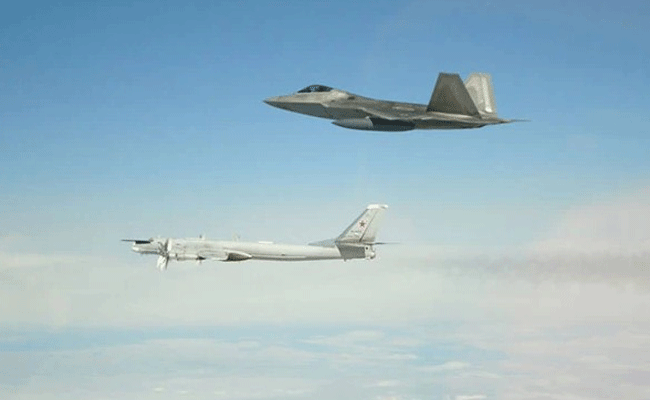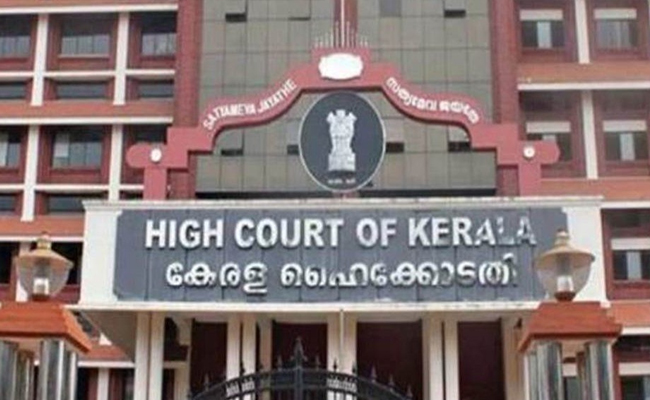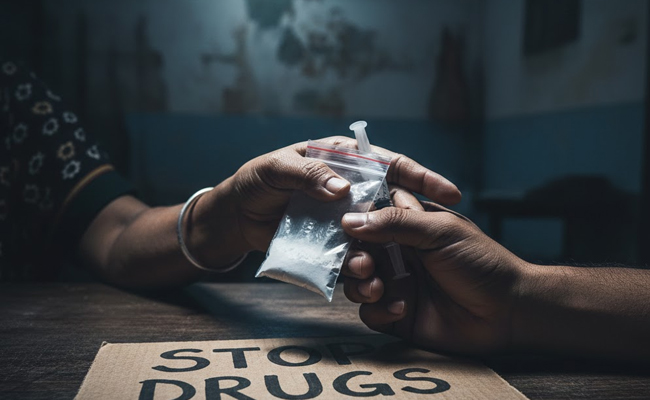Washington (PTI): A US fighter jet shot down an unknown object flying at the height of about 40,000 feet off the northern coast of Alaska on orders of President Joe Biden, officials said, less than a week after the military brought down a Chinese spy balloon that had flown across America.
According to Pentagon Press Secretary Brigadier General Pat Ryder, the object, which was about the size of a small car, was first detected inside American airspace on Thursday.
The object, whose origin is not known so far, posed a "reasonable threat to civilian air traffic", he said.
"US Northern Command is beginning recovery operations now," Ryder said, adding the F-22 fighter jet deployed an AIM-9X missile to take down the object.
This came almost a week after the US shot down a Chinese spy balloon off the coast of South Carolina in the Atlantic Ocean. It hovered over continental America for several days after entering the US airspace on January 30 in Montana.
China has acknowledged that the balloon was theirs but denied that it was for surveillance purposes rather than for weather monitoring and that it had drifted off course.
About the unidentified object over Alaska, Ryder told reporters at a news conference, "At the direction of the President of the United States, fighter aircraft assigned to US Northern Command successfully took down a high-altitude airborne object off the northern coast of Alaska at 1:45 pm Eastern Standard Time today (Friday) within US sovereign airspace over US territorial water."
"We have no further details about the object at this time, including any description of its capabilities, purpose or origin."
The object was not similar in size or shape to the high-altitude surveillance balloon that was taken down off the coast of South Carolina on February 4, he said.
The news of the shooting down of the unidentified object was first announced by the White House.
"Out of an abundance of caution and at the recommendation of the Pentagon, President Biden ordered the military to down the object. They did, and it came inside our territorial waters.
"Those waters right now are frozen but inside territorial airspace and over territorial waters," National Security Council Coordinator for Strategic Communications John Kirby told reporters at the White House.
Ryder said the recovery of the debris is taking place in a mix of ice and snow.
"The object was travelling northeasterly across Alaska. A two-ship flight of F-35s conducted identification of the object," he said.
"An F-22 out of Joint Base Elmendorf-Richardson -- assigned to US Northern Command -- shot down the object with an AIM-9X missile near Deadhorse, Alaska," Ryder said.
According to him, since the unidentified object posed a threat to civilian air traffic, a decision was taken to shoot it down.
"In terms of the spy balloon (downed a week ago), we have learnt a lot about the Chinese surveillance high-altitude balloon programme," he said.
"We gathered a lot of information over the last couple of years. Based on that, we were able to detect it at a very early stage as it approached US air space and we had a good understanding of what it was. We were able to monitor that closely while it went over the continental United States, learn a lot about it and take it down at the appropriate time," the Pentagon Press Secretary said.
Alaska Governor Mike Dunleavy said that the unidentified object, shot down on Friday, raises serious national security concerns.
"This latest intrusion into our airspace raises serious questions about the White House's decision to not shoot down a Chinese spy balloon last week when it was above the Aleutian Chain and prevent it from flying over important military sites in the Lower-48," he said.
Senator Mark Warner, Chairman of the Senate Permanent Select Committee on Intelligence said, "Glad to see the President act swiftly on this new intrusion to our airspace. I'm looking forward to more details becoming public as the recovery and investigation continue."
Meanwhile, the US Northern Command continued its operation to recover the remains of the Chinese high-altitude surveillance balloon that was down off the coast of South Carolina.
"Recovery teams have mapped the debris field and are in the process of searching for and identifying debris on the ocean floor. Debris that's been recovered so far is being loaded onto vessels, taken ashore, catalogued and then moved onwards to labs for subsequent analysis," Ryder said.
He noted that a significant amount of debris has been located so far that will prove helpful in understanding the balloon and its surveillance capabilities.
"Due to less than favourable sea right now, teams will continue to conduct underwater surveys and recovery as conditions permit. The department wants to thank our interagency partners from the US Coast Guard, the FBI and state and local authorities for their continuing assistance and partnership," the Pentagon press secretary added.
China insists the unmanned airship was a civilian weather balloon that had been blown off course. However, Beijing has not said to whom the balloon belonged to or offered other details
Let the Truth be known. If you read VB and like VB, please be a VB Supporter and Help us deliver the Truth to one and all.
Kochi (PTI): The Kerala High Court has set aside crucial stages of the land acquisition process for the proposed Sabarimala greenfield airport, holding that the state failed to properly assess the minimum land actually required for the project.
On December 30, 2022, the state government issued an order granting sanction for the acquisition of 2,570 acres of land, comprising the Cheruvally Estate and an additional 307 acres located outside it.
Justice C Jayachandran, delivering the judgment on a writ petition filed by Ayana Charitable Trust (formerly Gospel for Asia) and its managing trustee Dr Siny Punnoose, ruled the decision-making process under the Right to Fair Compensation and Transparency in Land Acquisition, Rehabilitation and Resettlement Act, 2013, was legally flawed.
The court, in its December 19 order, directed the state to restart the process by conducting a fresh social impact assessment limited to examining the minimum land requirement, followed by a fresh appraisal by the expert group and reconsideration by the government.
The petitioners had challenged several government actions, including the Social Impact Assessment (SIA) report, the expert committee appraisal, the state government order approving the acquisition, and the subsequent notification under Section 11 of the 2013 Act.
The land in question, mainly the Cheruvally Estate in Pathanamthitta district, is proposed to be acquired for building a new airport intended to serve Sabarimala pilgrims.
The court found that while the state is entitled to acquire land for public purposes, the law clearly mandates that only the "absolute bare minimum" extent of land required for a project can be acquired.
According to the court, this mandatory requirement under Sections 4(4)(d), 7(5)(b), and 8(1)(c) of the 2013 Act was not properly complied with.
Justice Jayachandran observed that the authorities had shown "manifest non-application of mind" in assessing how much land was genuinely necessary.
As a result, the SIA report, the Expert Committee report and the government order were declared invalid to the extent they failed to address this crucial requirement.
Since the Section 11 notification could only be issued after a valid completion of these steps, it too was quashed.
On the petitioners' allegation of fraud on power and colourable exercise of authority, the court did not give a final finding. It held that this issue is closely linked to determining the minimum land required and can only be examined after that exercise is properly completed.
Before concluding, the court suggested that for technically complex projects like airports, the state should include technical experts in the SIA team to ensure informed and lawful decision-making.
The writ petition was accordingly allowed, keeping other issues raised by the petitioners open for future consideration.





